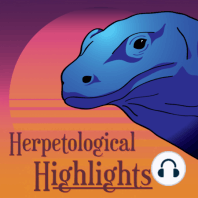67 min listen
004 Day Gecko Invasion
ratings:
Length:
82 minutes
Released:
Jun 27, 2017
Format:
Podcast episode
Description
Episode four is all about day geckos. We get into the lifestyles of these handsome creatures – first exploring Mauritian lowland forest day gecko’s choice of home. Following on from that, we chat about some cheeky Malagasy geckos with some peculiar dietary requirements, and then discuss the startling spread of giant day geckos on Reunion Island. Our Species of the Bi-Week is a gecko with a bizarre adaption to help it evade its foes. FULL REFERENCE LIST AVAILABLE AT: herphighlights.podbean.com
Main Paper References:
Buckland, Steeves, Nik C. Cole, Ben Godsall, Javier Rodríguez-Pérez, Laura E. Gallagher, Sion M. Henshaw, and Stephen Harris. 2014. “Habitat Selection of the Mauritian Lowland Forest Day Gecko at Multiple Spatial Scales: A Baseline for Translocation.” Global Ecology and Conservation 1: 71–79. OPEN ACCESS
Taylor, Benjamin, and Charlie Gardner. 2014. “Nectar Feeding by the Day Gecko Phelsuma Mutabilis (Squamata: Gekkonidae) on the Mangrove Tree Sonneratia Alba (Lythraceae) in Southwest Madagascar.” Herpetology Notes 7: 85–87. OPEN ACCESS
Gardner, Charlie, and Louise Jasper. 2015. “Diet of the Endemic Malagasy Day Gecko Phelsuma Modesta Leiogaster Mertens, 1970 in an Urban Environment.” Herpetology Notes 8: 489–92. OPEN ACCESS
Sanchez, Mickaël, and Jean-michel Probst. 2014. “Distribution and Habitat of the Invasive Giant Day Gecko Phelsuma Grandis Gray 1870 (Sauria : Gekkonidae ) in Reunion Island, and Conservation Implication.” Phelsuma 22: 13–28. OPEN ACCESS
Species of the Bi-Week:
Scherz, Mark D., Juan D. Daza, Jörn Köhler, Miguel Vences, and Frank Glaw. 2017. “Off the Scale: A New Species of Fish-Scale Gecko (Squamata: Gekkonidae: Geckolepis) with Exceptionally Large Scales.” PeerJ 5: e2955. OPEN ACCESS
Other Mentioned Papers/Studies:
Buckland, Steeves, Nik C. Cole, Jesús Aguirre-Gutiérrez, Laura E. Gallagher, Sion M. Henshaw, Aurélien Besnard, Rachel M. Tucker, Vishnu Bachraz, Kevin Ruhomaun, and Stephen Harris. 2014. “Ecological Effects of the Invasive Giant Madagascar Day Gecko on Endemic Mauritian Geckos: Applications of Binomial-Mixture and Species Distribution Models.” PLoS ONE 9 (4). OPEN ACCESS
Clémencet, Johanna, Cyril Aubert, Doriane Blottière, and Mickaël Sanchez. 2013. “Kleptoparasitism in the Endemic Gecko Phelsuma Inexpectata: Pollen Theft from Foraging Honeybees on Réunion.” Journal of Tropical Ecology 29: 251–54.
Glaw, Frank, and Miguel Vences. 2007. A field guide to the amphibians and reptiles of Madagascar.
Grassi, Christina. 2006. “Variability in Habitat, Diet, and Social Structure of Hapalemur Griseus in Ranomafana National Park, Madagascar.” American Journal of Physical Anthropology 131 (1): 50–63.
Long, Emma, and Paul a. Racey. 2007. “An Exotic Plantation Crop as a Keystone Resource for an Endemic Megachiropteran, Pteropus Rufus, in Madagascar.” Journal of Tropical Ecology 23 (July 2007): 397.
Rocha, S, H Rosler, P S Gehring, F Glaw, D Posada, D. James Harris, and M Vences. 2010. “Phylogenetic Systematics of Day Geckos, Genus Phelsuma, Based on Molecular and Morphological Data (Squamata: Gekkonidae).” Zootaxa 2429: 1–28. Isi:000276751900001. OPEN ACCESS
Thomas, Dana L., and Eric J. Taylor. 1990. “Study Designs and Tests for Comparing Resource Use and Availability.” Journal of Wildlife Management 54 (2): 322–30. OPEN ACCESS
Other Links/Mentions:
Video from Clémencet et al. 2013 – https://www.cambridge.org/core/journals/journal-of-tropical-ecology/article/kleptoparasitism-in-the-endemic-gecko-phelsuma-inexpectata-pollen-theft-from-foraging-honeybees-on-reunion/EAC9B645C3240BAA31B9E6B198B360E0#fndtn-supplementary-materials
Music – http://www.purple-planet.com
Main Paper References:
Buckland, Steeves, Nik C. Cole, Ben Godsall, Javier Rodríguez-Pérez, Laura E. Gallagher, Sion M. Henshaw, and Stephen Harris. 2014. “Habitat Selection of the Mauritian Lowland Forest Day Gecko at Multiple Spatial Scales: A Baseline for Translocation.” Global Ecology and Conservation 1: 71–79. OPEN ACCESS
Taylor, Benjamin, and Charlie Gardner. 2014. “Nectar Feeding by the Day Gecko Phelsuma Mutabilis (Squamata: Gekkonidae) on the Mangrove Tree Sonneratia Alba (Lythraceae) in Southwest Madagascar.” Herpetology Notes 7: 85–87. OPEN ACCESS
Gardner, Charlie, and Louise Jasper. 2015. “Diet of the Endemic Malagasy Day Gecko Phelsuma Modesta Leiogaster Mertens, 1970 in an Urban Environment.” Herpetology Notes 8: 489–92. OPEN ACCESS
Sanchez, Mickaël, and Jean-michel Probst. 2014. “Distribution and Habitat of the Invasive Giant Day Gecko Phelsuma Grandis Gray 1870 (Sauria : Gekkonidae ) in Reunion Island, and Conservation Implication.” Phelsuma 22: 13–28. OPEN ACCESS
Species of the Bi-Week:
Scherz, Mark D., Juan D. Daza, Jörn Köhler, Miguel Vences, and Frank Glaw. 2017. “Off the Scale: A New Species of Fish-Scale Gecko (Squamata: Gekkonidae: Geckolepis) with Exceptionally Large Scales.” PeerJ 5: e2955. OPEN ACCESS
Other Mentioned Papers/Studies:
Buckland, Steeves, Nik C. Cole, Jesús Aguirre-Gutiérrez, Laura E. Gallagher, Sion M. Henshaw, Aurélien Besnard, Rachel M. Tucker, Vishnu Bachraz, Kevin Ruhomaun, and Stephen Harris. 2014. “Ecological Effects of the Invasive Giant Madagascar Day Gecko on Endemic Mauritian Geckos: Applications of Binomial-Mixture and Species Distribution Models.” PLoS ONE 9 (4). OPEN ACCESS
Clémencet, Johanna, Cyril Aubert, Doriane Blottière, and Mickaël Sanchez. 2013. “Kleptoparasitism in the Endemic Gecko Phelsuma Inexpectata: Pollen Theft from Foraging Honeybees on Réunion.” Journal of Tropical Ecology 29: 251–54.
Glaw, Frank, and Miguel Vences. 2007. A field guide to the amphibians and reptiles of Madagascar.
Grassi, Christina. 2006. “Variability in Habitat, Diet, and Social Structure of Hapalemur Griseus in Ranomafana National Park, Madagascar.” American Journal of Physical Anthropology 131 (1): 50–63.
Long, Emma, and Paul a. Racey. 2007. “An Exotic Plantation Crop as a Keystone Resource for an Endemic Megachiropteran, Pteropus Rufus, in Madagascar.” Journal of Tropical Ecology 23 (July 2007): 397.
Rocha, S, H Rosler, P S Gehring, F Glaw, D Posada, D. James Harris, and M Vences. 2010. “Phylogenetic Systematics of Day Geckos, Genus Phelsuma, Based on Molecular and Morphological Data (Squamata: Gekkonidae).” Zootaxa 2429: 1–28. Isi:000276751900001. OPEN ACCESS
Thomas, Dana L., and Eric J. Taylor. 1990. “Study Designs and Tests for Comparing Resource Use and Availability.” Journal of Wildlife Management 54 (2): 322–30. OPEN ACCESS
Other Links/Mentions:
Video from Clémencet et al. 2013 – https://www.cambridge.org/core/journals/journal-of-tropical-ecology/article/kleptoparasitism-in-the-endemic-gecko-phelsuma-inexpectata-pollen-theft-from-foraging-honeybees-on-reunion/EAC9B645C3240BAA31B9E6B198B360E0#fndtn-supplementary-materials
Music – http://www.purple-planet.com
Released:
Jun 27, 2017
Format:
Podcast episode
Titles in the series (100)
018 Big Trouble in Little Chameleons: There is no denying that chameleons are fascinating lizards, but why should the tree-dwelling ones get all the credit? In this episode we unearth some recent discoveries concerning Brookesia and friends, as well as taking a look at the world's shortest l... by Herpetological Highlights
